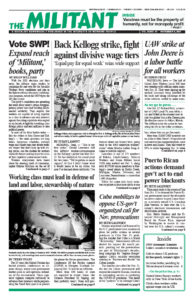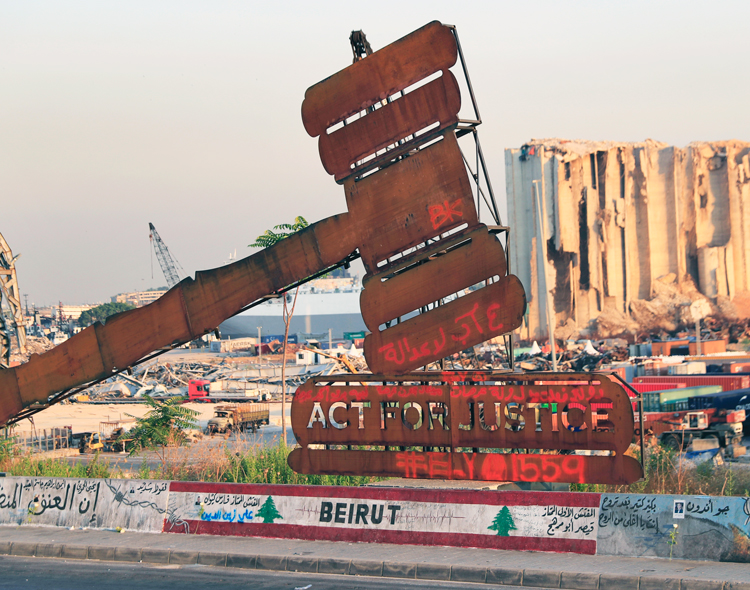Leaders of the reactionary Hezbollah in Lebanon claim the Oct. 14 sniper attack that killed seven and injured some 30 people at a protest it organized was carried out by rival Christian-based Lebanese Forces.
Hezbollah, a Tehran-backed group organized in predominantly Shiite neighborhoods, has a powerful and well-armed militia. Hezbollah and its allies dominate the country’s coalition government. Lebanese Forces militias fought Hezbollah and other Muslim-based groups during the country’s 1975-1990 civil war.
Lebanese Forces leaders repeatedly deny starting the deadly October conflict. They say Hezbollah-led demonstrators, some armed, approached a Christian neighborhood and that residents there fired on them in self-defense. Lebanese Forces leader Samir Geagea was summoned Oct. 25 to testify before a military court over the clashes. Sixty-eight people have been charged so far over the killings.
Hundreds of supporters of Hezbollah and its allies in the Shiite-based Amal Movement had been demonstrating to demand the removal of Tarek Bitar, the judge investigating a huge explosion at the port of Beirut in August of last year. The blast killed over 200 people, injured thousands more and forced a quarter of a million to flee their homes.
The disaster was caused by the detonation of 2,750 tons of highly flammable ammonium nitrate kept in a port warehouse near densely populated residential areas. For six years authorities debated what to do about this but did nothing, even after a fire started there. Hezbollah uses Beirut’s port to store its weaponry supplied by Tehran.
Hezbollah and Amal leaders are trying to prevent the judge from issuing arrest warrants against top officials allied with their organizations. Bitar’s investigation is popular with many of the families of victims of the explosion.
In the aftermath of the killings, Hassan Nasrallah, head of Hezbollah, accused Geagea of trying to restart the civil war and boasted that Hezbollah’s militias numbered 100,000 armed fighters. The entire Lebanese army is only 85,000.
Nearly 2,000 members of Hezbollah have been killed in the last decade during the group’s bloody intervention aiding Tehran in neighboring Syria’s civil war. They have fought to prop up Bashar al-Assad’s widely hated regime and to extend the military, economic and political sway of the Iranian rulers in the region. Over a million Syrians have sought refuge in Lebanon since the civil war began.
Having dominated successive Lebanese governments, Hezbollah is now identified in the eyes of many working people as part of the capitalist ruling class that has enriched itself and is responsible for the sharply worsening conditions they face.
Economic crisis hits workers
The resources of Lebanon’s army have been depleted by the financial crisis since the devaluation of the country’s currency, the Lebanese pound. Security chiefs warned recently that the crash in the value of soldiers’ wages would undermine their combat morale. Undersecretary of State for Political Affairs Victoria Nuland announced a further $67 million in aid to the Lebanese military during an Oct. 14 visit to Beirut. The U.S. rulers seek to bolster the Lebanese army in order to counter Hezbollah and Tehran.
Nuland also pushed for the Lebanese government under Prime Minister Najib Mikati to reach an austerity agreement with the International Monetary Fund.
Both the Lebanese rulers and the imperialist-backed IMF agree the “solution” to the economic crisis requires ending subsidies on imported food, medicines and fuel that working people depend upon. This would come on top of already dire shortages of these vital supplies.
Inflation, sharply exacerbated by the 90% collapse of the Lebanese pound, has produced a fall in the real income of working people by over a third. Food prices have risen 557% since October 2019.
Two years ago hundreds of thousands poured into the streets of Beirut, angered by a lack of jobs and to protest the country’s sectarian-based political order that divides government positions along religious lines. They chanted, “We are all Lebanese. On the streets, we are not Shiite or Sunni or Christian. We are citizens.”
Today the impact of the economic crisis is far deeper.


